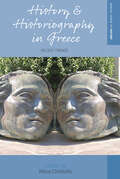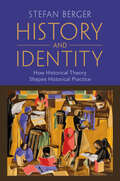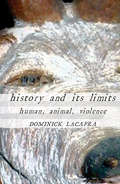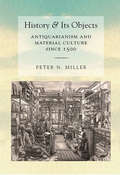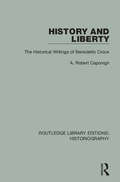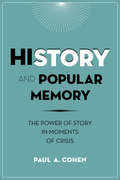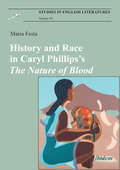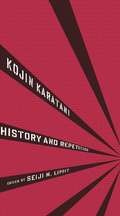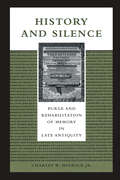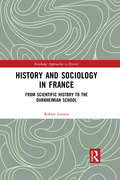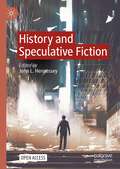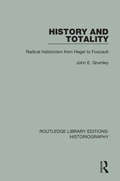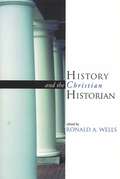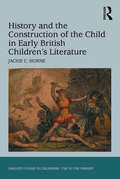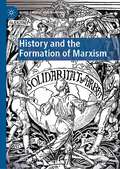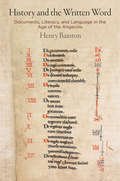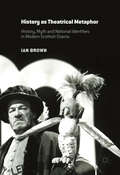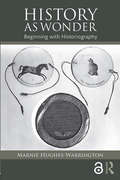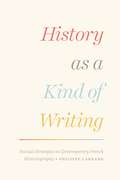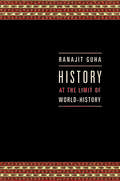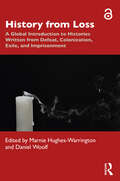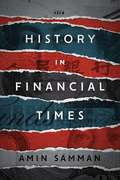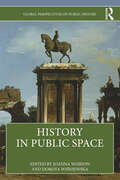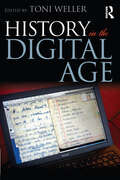- Table View
- List View
History and Historiography in Greece: Recent Trends (Making Sense of History)
by Nikos ChristofisAn updated guide to Greek historiography was long overdue. In this comprehensive and temporally wide-ranging reassessment, History and Historiography in Greece examines the evolution of Greek historical scholarship by reviewing the ideas, methods, and schools of history shaping the field. From how these developments correspond with international trends, to their rate of development alongside global shifts in scholarship, this volume identifies not only the ideological limitations shaping Greek academia, but also the innovations that are breaking new ground. In doing so, the contributors illuminate how those developments yield new lessons for existing conceptual frameworks within the fields of labor, gender, diaspora studies, and more.
History and Identity
by Stefan BergerThis introduction to contemporary historical theory and practice shows how issues of identity have shaped how we write history. Stefan Berger charts how a new self-reflexivity about what is involved in the process of writing history entered the historical profession and the part that historians have played in debates about the past and its meaningfulness for the present. He introduces key trends in the theory of history such as postmodernism, poststructuralism, constructivism, narrativism and the linguistic turn and reveals, in turn, the ways in which they have transformed how historians have written history over the last four decades. The book ranges widely from more traditional forms of history writing, such as political, social, economic, labour and cultural history, to the emergence of more recent fields, including gender history, historical anthropology, the history of memory, visual history, the history of material culture, and comparative, transnational and global history.
History and Its Limits: Human, Animal, Violence
by Dominick LacapraDominick LaCapra's History and Its Limits articulates the relations among intellectual history, cultural history, and critical theory, examining the recent rise of "Practice Theory" and probing the limitations of prevalent forms of humanism. LaCapra focuses on the problem of understanding extreme cases, specifically events and experiences involving violence and victimization. He asks how historians treat and are simultaneously implicated in the traumatic processes they attempt to represent. In addressing these questions, he also investigates violence's impact on various types of writing and establishes a distinctive role for critical theory in the face of an insufficiently discriminating aesthetic of the sublime (often unreflectively amalgamated with the uncanny). In History and Its Limits, LaCapra inquires into the related phenomenon of a turn to the "postsecular," even the messianic or the miraculous, in recent theoretical discussions of extreme events by such prominent figures as Giorgio Agamben, Eric L. Santner, and Slavoj Zizek. In a related vein, he discusses Martin Heidegger's evocative, if not enchanting, understanding of "The Origin of the Work of Art." LaCapra subjects to critical scrutiny the sometimes internally divided way in which violence has been valorized in sacrificial, regenerative, or redemptive terms by a series of important modern intellectuals on both the far right and the far left, including Georges Sorel, the early Walter Benjamin, Georges Bataille, Frantz Fanon, and Ernst Jünger. Violence and victimization are prominent in the relation between the human and the animal. LaCapra questions prevalent anthropocentrism (evident even in theorists of the "posthuman") and the long-standing quest for a decisive criterion separating or dividing the human from the animal. LaCapra regards this attempt to fix the difference as misguided and potentially dangerous because it renders insufficiently problematic the manner in which humans treat other animals and interact with the environment. In raising the issue of desirable transformations in modernity, History and Its Limits examines the legitimacy of normative limits necessary for life in common and explores the disconcerting role of transgressive initiatives beyond limits (including limits blocking the recognition that humans are themselves animals).
History and Its Objects: Antiquarianism and Material Culture since 1500
by Peter N. MillerCultural history is increasingly informed by the history of material culture—the ways in which individuals or entire societies create and relate to objects both mundane and extraordinary—rather than on textual evidence alone. Books such as The Hare with Amber Eyes and A History of the World in 100 Objects indicate the growing popularity of this way of understanding the past. In History and Its Objects, Peter N. Miller uncovers the forgotten origins of our fascination with exploring the past through its artifacts by highlighting the role of antiquarianism—a pursuit ignored and derided by modem academic history—in grasping the significance of material culture.From the efforts of Renaissance antiquarians, who reconstructed life in the ancient world from coins, inscriptions, seals, and other detritus, to amateur historians in the nineteenth century working within burgeoning national traditions, Miller connects collecting—whether by individuals or institutions—to the professionalization of the historical profession, one which came to regard its progenitors with skepticism and disdain. The struggle to articulate the value of objects as historical evidence, then, lies at the heart both of academic history-writing and of the popular engagement with things. Ultimately, this book demonstrates that our current preoccupation with objects is far from novel and reflects a human need to reexperience the past as a physical presence.
History and Liberty: The Historical Writings of Benedetto Croce (Routledge Library Editions: Historiography)
by A R CaponigriA re-newed interest in, and appreciation of, the problems of history, both as the theory of historical process and as historiography became one of the marked characteristics of twentieth century thought and this book discusses Benedetto Croce’s historical writings in that context.
History and Popular Memory
by Paul A CohenWhen people experience a traumatic event, such as war or the threat of annihilation, they often turn to history for stories that promise a positive outcome to their suffering. During World War II, the French took comfort in the story of Joan of Arc and her heroic efforts to rid France of foreign occupation. To bring the Joan narrative more into line with current circumstances, popular retellings modified the original story so that what people believed took place in the past was often quite different from what actually occurred.Paul A. Cohen believes this interplay between story and history is a worldwide phenomenon found in countries of radically different cultural, religious, and social character. He focuses on Serbia, Israel, the Soviet Union, China, Great Britain, and France, all of which experienced severe crises in the twentieth century and, in response, appropriated age-old historical narratives that resonated with what was happening in the present to serve a unifying, restorative purpose.A central theme in the book is the distinction between popular memory and history. Although vitally important to historians, this distinction is routinely blurred in people's minds, and the historian's truth often cannot compete with the power of a compelling story from the past, even when it has been seriously distorted by myth or political manipulation. Cohen concludes by suggesting that the patterns of interaction he probes, given their near universality, may well be rooted in certain human propensities that transcend cultural difference.
History and Popular Memory: The Power of Story in Moments of Crisis
by Paul CohenWhen people experience a traumatic event, such as war or the threat of annihilation, they often turn to history for stories that promise a positive outcome to their suffering. During World War II, the French took comfort in the story of Joan of Arc and her heroic efforts to rid France of foreign occupation. To bring the Joan narrative more into line with current circumstances, however, popular retellings modified the original story so that what people believed took place in the past was often quite different from what actually occurred.Paul A. Cohen identifies this interplay between story and history as a worldwide phenomenon, found in countries of radically different cultural, religious, and social character. He focuses here on Serbia, Israel, China, France, the Soviet Union, and Great Britain, all of which experienced severe crises in the twentieth century and, in response, appropriated age-old historical narratives that resonated with what was happening in the present to serve a unifying, restorative purpose. A central theme in the book is the distinction between popular memory and history. Although vitally important to historians, this distinction is routinely blurred in people's minds, and the historian's truth often cannot compete with the power of a compelling story from the past, even when it has been seriously distorted by myth or political manipulation. Cohen concludes by suggesting that the patterns of interaction he probes, given their near universality, may well be rooted in certain human propensities that transcend cultural difference.
History and Race in Caryl Phillips’s The Nature of Blood (Studies in English Literatures #20)
by Maria FestaThis monograph examines Caryl Phillips’s The Nature of Blood (1997), a novel exploring recurring expressions of exclusion and discrimination throughout history with particular focus on Jewish and African diasporas and the storytelling of its migrant characters. Particular attention is given to the analysis of characters revealing different facets of the Jewish question. Maria Festa also provides a historical excursus on the notion of race and considers another character alluding to Shakespeare’s Othello to expose the paradoxes of the relationship between subjugator and subjugated. The study makes the case that among the novel’s most remarkable achievements is Phillips’s effort to redress the absence of the Other from our history, that by depicting experiences of displacement, and by confronting readers with seemingly disconnected narrative fragments, The Nature of Blood is a reminder of the missing stories, the voices—marginalised and often racialized—that Western history has consistently failed to include in its accounts of the past and arguably its present.
History and Repetition (Weatherhead Books on Asia)
by Kojin KarataniKojin Karatani wrote the essays in History and Repetition during a time of radical historical change, triggered by the collapse of the Cold War and the death of the Showa emperor in 1989. Reading Karl Marx in an original way, Karatani developed a theory of history based on the repetitive cycle of crises attending the expansion and transformation of capital. His work led to a rigorous analysis of political, economic, and literary forms of representation that recast historical events as a series of repeated forms forged in the transitional moments of global capitalism.History and Repetition cemented Karatani's reputation as one of Japan's premier thinkers, capable of traversing the fields of philosophy, political economy, history, and literature in his work. The first complete translation of History and Repetition into English, undertaken with the cooperation of Karatani himself, this volume opens with his innovative reading of The Eighteenth Brumaire of Louis Bonaparte, tracing Marx's early theoretical formulation of the state. Karatani follows with a study of violent crises as they recur after major transitions of power, developing his theory of historical repetition and introducing a groundbreaking interpretation of fascism (in both Europe and Japan) as the spectral return of the absolutist monarch in the midst of a crisis of representative democracy. For Karatani, fascism represents the most violent materialization of the repetitive mechanism of history. Yet he also seeks out singularities that operate outside the brutal inevitability of historical repetition, whether represented in literature or, more precisely, in the process of literature's demise. Closely reading the works of Oe Kenzaburo, Mishima Yukio, Nakagami Kenji, and Murakami Haruki, Karatani compares the recurrent and universal with the singular and unrepeatable, while advancing a compelling theory of the decline of modern literature. Merging theoretical arguments with a concrete analysis of cultural and intellectual history, Karatani's essays encapsulate a brilliant, multidisciplinary perspective on world history.
History and Silence: Purge and Rehabilitation of Memory in Late Antiquity
by Charles W. Hedrick&“It is so rare and refreshing to read a Roman history book which recognizes and celebrates the sheer difficulty of writing history&” (The Times Literary Supplement). The ruling elite in ancient Rome sought to eradicate even the memory of their deceased opponents through a process now known as damnatio memoriae. These formal and traditional practices included removing the person&’s name and image from public monuments and inscriptions, making it illegal to speak of him, and forbidding funeral observances and mourning. Paradoxically, however, while these practices dishonored the person's memory, they did not destroy it. Indeed, a later turn of events could restore the offender not only to public favor but also to re-inclusion in the public record. This book examines the process of purge and rehabilitation of memory in the person of Virius Nicomachus Flavianus. Charles Hedrick describes how Flavianus was condemned for participating in the rebellion against the Christian emperor Theodosius the Great—and then restored to the public record a generation later as members of the newly Christianized senatorial class sought to reconcile their pagan past and Christian present. By selectively remembering and forgetting the actions of Flavianus, Hedrick asserts, the Roman elite honored their ancestors while participating in profound social, cultural, and religious change. &“One of the most interesting and original books about the Later Roman Empire that I have ever read.&” —T. D. Barnes
History and Sociology in France: From Scientific History to the Durkheimian School (Routledge Approaches to History #23)
by Robert LerouxIn the late 19th century and early part of the 20th, with the coming of age of sociology in France, the idea that there could be a “science” of history was the subject of much and varied debate. The methodological problems surrounding historical knowledge that were debated throughout this period concerned not only scientific history, but the social sciences as well, and sociology more specifically. Although sociology was from its origins in competition with the discipline of history, from the outset, it too was interested in history as a form of objective knowledge. Many of sociology's founders believed that by retracing historical processes, they could make a clean break with abstraction and metaphysics. For their part, historians generally remained hostile to any kind of systematization. And yet, at the end of the 19th century, the science of history would draw some valuable lessons from the emerging methodology of sociology. It was in large part under the impetus of the issues and problems raised by the philosopher Henri Berr and by the Durkheimian School, with the economist François Simiand as its lead protagonist, that the community of historians, increasingly aware of the limits of narrative history, turned so enthusiastically to social and economic history – just as Durkheim and his disciples consulted history in order to avoid the twin pitfalls of the philosophy of history and of introspective psychology. History and Sociology in France focuses on this dialogue of the two neighboring sciences.
History and Speculative Fiction
by John L. HennesseyThis open access book demonstrates that despite different epistemological starting points, history and speculative fiction perform similar work in “making the strange familiar” and “making the familiar strange” by taking their readers on journeys through space and time. Excellent history, like excellent speculative fiction, should cause readers to reconsider crucial aspects of their society that they normally overlook or lead them to reflect on radically different forms of social organization. Drawing on Gunlög Fur’s postcolonial concept of concurrences, and with contributions that explore diverse examples of speculative fiction and historical encounters using a variety of disciplinary approaches, this volume provides new perspectives on colonialism, ecological destruction, the nature of humanity, and how to envision a better future.
History and Totality: Radical Historicism From Hegel to Foucault (Routledge Library Editions: Historiography)
by John GrumleyIn this work, originally published in 1989, the author establishes a tradition of radical historicism from Hegel to the Budapenst School. He charts both its continuous evolution from the early 19th century to the late 20thh, and its transformation in the context of European social, economic and cultural change. Through a reappraisal of historical interpretation from Hegel to Foucault, the book demonstrates the contemporary relevance of radical historicism. It includes detailed analyses of Marx, Dilthey, Simmel, Weber, Lukácks, Horkheimer, Adorno and Habermas.
History and the Christian Historian
by Ronald A. WellsThis volume arises out of special concerns of historians who are also Christians. What case can be made for connecting historical work and religious convictions? What is the relation of faith to history? What difference could Christian perspectives make in historical study? Thirteen respected scholars — including some who have changed the face of history writing in the twentieth century — here take up a diversity of subjects in giving a provisional answer to these important questions. In exploring foundational issues of perspective and theory, engaging discrete themes such as feminism, puritanism, and missiology, and discussing the application of religious insights in teaching history, this excellent collection of essays forthrightly addresses the &“epistemological crisis&” brought on by the postmodern critique of truth and demonstrates the positive implications of a Christian perspective for the study of history and historiography.
History and the Construction of the Child in Early British Children's Literature (Studies in Childhood, 1700 to the Present)
by Jackie C. HorneHow did the 'flat' characters of eighteenth-century children's literature become 'round' by the mid-nineteenth? While previous critics have pointed to literary Romanticism for an explanation, Jackie C. Horne argues that this shift can be better understood by looking to the discipline of history. Eighteenth-century humanism believed the purpose of history was to teach private and public virtue by creating idealized readers to emulate. Eighteenth-century children's literature, with its impossibly perfect protagonists (and its equally imperfect villains) echoes history's exemplar goals. Exemplar history, however, came under increasing pressure during the period, and the resulting changes in historiographical practice - an increased need for reader engagement and the widening of history's purview to include the morals, manners, and material lives of everyday people - find their mirror in changes in fiction for children. Horne situates hitherto neglected Robinsonades, historical novels, and fictionalized histories within the cultural, social, and political contexts of the period to trace the ways in which idealized characters gradually gave way to protagonists who fostered readers' sympathetic engagement. Horne's study will be of interest to specialists in children's literature, the history of education, and book history.
History and the Formation of Marxism (Marx, Engels, and Marxisms)
by Bertel NygaardThis book redefines the relationship between Marxism and history. At its roots, Marxism was aimed at analyzing society in order to change it, reflecting on the past to create the ‘poetry of the future.’ No single event of the past was as important to early Marxists as the French Revolution of 1789. Studying the varying uses of the history of that past event among Karl Marx, Friedrich Engels, and prominent European Marxists before 1914 (Karl Kautsky, V.I. Lenin, and others), this book argues that we should take the historiography of concrete past events seriously. It was not only an auxiliary element of Marxism, but a core constitutive element in its formation. Thus, this book calls for transcending traditional approaches to Marxism as a fixed set of social theories combined with strategies for the present and future. Important to students of Marxism, the labor movement, and the French Revolution alike, this study contains refreshing perspectives on the interplay between past, present, and future and on the role of states, social classes, socio-economic determination, and political organization in history.
History and the Written Word: Documents, Literacy, and Language in the Age of the Angevins (The Middle Ages Series)
by Henry BaintonComing upon the text of a document such as a charter or a letter inserted into the fabric of a medieval chronicle and quoted in full or at length, modern readers might well assume that the chronicler is simply doing what good historians have always done—that is, citing his source as evidence. Such documentary insertions are not ubiquitous in medieval historiography, however, and are in fact particularly characteristic of the history-writing produced by the Angevins in England and Northern France in the later twelfth century.In History and the Written Word, Henry Bainton puts these documentary gestures center stage in an attempt to understand what the chroniclers were doing historiographically, socially, and culturally when they transcribed a document into a work of history. Where earlier scholars who have looked at the phenomenon have explained this increased use of documents by considering the growing bureaucratic state and an increasing historiographical concern for documentary evidence, Bainton seeks to resituate these histories, together with their authors and users, within literate but sub-state networks of political power. Proposing a new category he designates "literate lordship" to describe the form of power with which documentary history-writing was especially concerned, he shows how important the vernacular was in recording the social lives of these literate lords and how they found it a particularly appropriate medium through which to record their roles in history.Drawing on the perspectives of modern and medieval narratology, medieval multilingualism, and cultural memory, History and the Written Word argues that members of an administrative elite demonstrated their mastery of the rules of literate political behavior by producing and consuming history-writing and its documents.
History as Theatrical Metaphor
by Ian BrownThis revelatory study explores how Scottish history plays, especially since the 1930s, raise issues of ideology, national identity, historiography, mythology, gender and especially Scottish language. Covering topics up to the end of World War Two, the book addresses the work of many key figures from the last century of Scottish theatre, including Robert McLellan and his contemporaries, and also Hector MacMillan, Stewart Conn, John McGrath, Donald Campbell, Bill Bryden, Sue Glover, Liz Lochhead, Jo Clifford, Peter Arnott, David Greig, Rona Munro and others often neglected or misunderstood. Setting these writers' achievements in the context of their Scottish and European predecessors, Ian Brown offers fresh insights into key aspects of Scottish theatre. As such, this represents the first study to offer an overarching view of historical representation on Scottish stages, exploring the nature of 'history' and 'myth' and relating these afresh to how dramatists use - and subvert - them. Engaging and accessible, this innovative book will attract scholars and students interested in history, ideology, mythology, theatre politics and explorations of national and gender identity.
History as Wonder: Beginning with Historiography
by Marnie Hughes-WarringtonHistory and Wonder is a refreshing new take on the idea of history that tracks the entanglement of history and philosophy over time through the key idea of wonder. From Ancient Greek histories and wonder works, to Islamic curiosities and Chinese strange histories, through to European historical cabinets of curiosity and on to histories that grapple with the horrors of the Holocaust, Marnie Hughes-Warrington unpacks the ways in which historians throughout the ages have tried to make sense of the world, and to change it. This book considers histories and historians across time and space, including the Ancient Greek historian Polybius, the medieval texts by historians such as Bede in England and Ibn Khaldun in Islamic Historiography, and the more recent works by Martin Heidegger, Luce Irigaray and Ranajit Guha among others. It explores the different ways in which historians have called upon wonder to cross boundaries between the past and the present, the universal and the particular, the old and the new, and the ordinary and the extraordinary. Promising to both delight and unsettle, it shows how wonder works as the beginning of historiography. Accessible, engaging and wide-ranging, History as Wonder provides an original addition to the field of historiography that is ideal for those both new to and familiar with the study of history.
History as a Kind of Writing: Textual Strategies in Contemporary French Historiography
by Philippe CarrardIn academia, the traditional role of the humanities is being questioned by the “posts”—postmodernism, poststructuralism, and postfeminism—which means that the project of writing history only grows more complex. In History as a Kind of Writing, scholar of French literature and culture Philippe Carrard speaks to this complexity by focusing the lens on the current state of French historiography. Carrard’s work here is expansive—examining the conventions historians draw on to produce their texts and casting light on views put forward by literary theorists, theorists of history, and historians themselves. Ranging from discussions of lengthy dissertations on 1960s social and economic history to a more contemporary focus on events, actors, memory, and culture, the book digs deep into the how of history. How do historians arrange their data into narratives? What strategies do they employ to justify the validity of their descriptions? Are actors given their own voice? Along the way, Carrard also readdresses questions fundamental to the field, including its necessary membership in the narrative genre, the presumed objectivity of historiographic writing, and the place of history as a science, distinct from the natural and theoretical sciences.
History at the Limit of World-History (Italian Academy Lectures)
by Ranajit GuhaThe past is not just, as has been famously said, another country with foreign customs: it is a contested and colonized terrain. Indigenous histories have been expropriated, eclipsed, sometimes even wholly eradicated, in the service of imperialist aims buttressed by a distinctly Western philosophy of history. Ranajit Guha, perhaps the most influential figure in postcolonial and subaltern studies at work today, offers a critique of such historiography by taking issue with the Hegelian concept of World-history. That concept, he contends, reduces the course of human history to the amoral record of states and empires, great men and clashing civilizations. It renders invisible the quotidian experience of ordinary people and casts off all that came before it into the nether-existence known as "Prehistory."On the Indian subcontinent, Guha believes, this Western way of looking at the past was so successfully insinuated by British colonization that few today can see clearly its ongoing and pernicious influence. He argues that to break out of this habit of mind and go beyond the Eurocentric and statist limit of World-history historians should learn from literature to make their narratives doubly inclusive: to extend them in scope not only to make room for the pasts of the so-called peoples without history but to address the historicality of everyday life as well. Only then, as Guha demonstrates through an examination of Rabindranath Tagore's critique of historiography, can we recapture a more fully human past of "experience and wonder."
History from Loss: A Global Introduction to Histories written from defeat, colonization, exile, and imprisonment
by Marnie Hughes-Warrington Daniel WoolfHistory from Loss challenges the common thought that "history is written by the winners" and explores how history-makers in different times and places across the globe have written histories from loss, even when this has come at the threat to their own safety. A distinguished group of historians from around the globe offer an introduction to different history-makers’ lives and ideas, and important extracts from their works which highlight various meanings of loss: from physical ailments to social ostracism, exile to imprisonment, and from dispossession to potential execution. Throughout the volume consideration of the information "bubbles" of different times and places helps to show how information has been weaponized to cause harm. In this way, the text helps to put current debates about the biases and weaponization of platforms such as social media into global and historical perspectives. In combination, the chapters build a picture of history from loss which is global, sustained, and anything but a simple mirror of history made by victors. The volume also includes an Introduction and Afterword, which draw out the key meanings of history from loss and which offer ideas for further exploration. History from Loss provides an invaluable resource for students, teachers, and general readers who wish to put current debates on bias, the politicization of history, and threats to history-makers into global and historical perspectives. The Open Access version of this book, available at www.taylorfrancis.com, has been made available under a Creative Commons Attribution-Non Commercial-No Derivatives 4.0 license.
History in Financial Times (Currencies: New Thinking for Financial Times)
by Amin SammanCritical theorists of economy tend to understand the history of market society as a succession of distinct stages. This vision of history rests on a chronological conception of time whereby each present slips into the past so that a future might take its place. This book argues that the linear mode of thinking misses something crucial about the dynamics of contemporary capitalism. Rather than each present leaving a set past behind it, the past continually circulates through and shapes the present, such that historical change emerges through a shifting panorama of historical associations, names, and dates. The result is a strange feedback loop between now and then, real and imaginary. Demonstrating how this idea can give us a better purchase on financial capitalism in the post-crisis era, History in Financial Times traces the diverse modes of history production at work in the spheres of financial journalism, policymaking, and popular culture. Paying particular attention to narrative and to notions of crisis, recurrence, and revelation, Amin Samman gives us a novel take on the relation between historical thinking and critique.
History in Public Space (Global Perspectives on Public History)
by Joanna Wojdon Dorota WiśniewskaThis book focuses on various manifestations of history in public spaces: in the physical ones of various historical times and geographical places, as well as in the virtual world.It discusses how the spaces have been shaped and re-shaped, by whom and for what (not always laudable) purposes, and raises pragmatical and ethical questions for both research and practical activities in the field. By combining both micro and global perspectives, the universal role that history plays in spaces created by and for, as well as the factors determining its usages, is revealed. The authors are rooted in specific national contexts: Canadian or American, Ukrainian or Polish, British or Irish, German or Luxembourgish, Korean or Brazilian, and the case studies are varied including large cities and small towns, city centers, and godforsaken cemeteries, but the narratives built on these cases go beyond when they deal with issues such as decoding history and its meanings in public spaces, doing history in public spaces, and observing changes in manifestations of history in public spaces.This volume is an essential resource for anyone interested in the relationship between history and public space in a global perspective.
History in the Digital Age
by Toni WellerThe digital age is affecting all aspects of historical study, but much of the existing literature about history in the digital age can be alienating to the traditional historian who does not necessarily value or wish to embrace digital resources. History in the Digital Age takes a more conceptual look at how the digital age is affecting the field of history for both scholars and students. The printed copy, the traditional archive, and analogue research remain key constitute parts for most historians and for many will remain precious and esteemed over digital copies, but there is a real need for historians and students of history to seriously consider some of the conceptual and methodological challenges facing the field of historical enquiry as we enter the twenty-first century. Including international contributors from a variety of disciplines - History, English, Information Studies and Archivists – this book does not seek either to applaud or condemn digital technologies, but takes a more conceptual view of how the field of history is being changed by the digital age. Essential reading for all historians.
